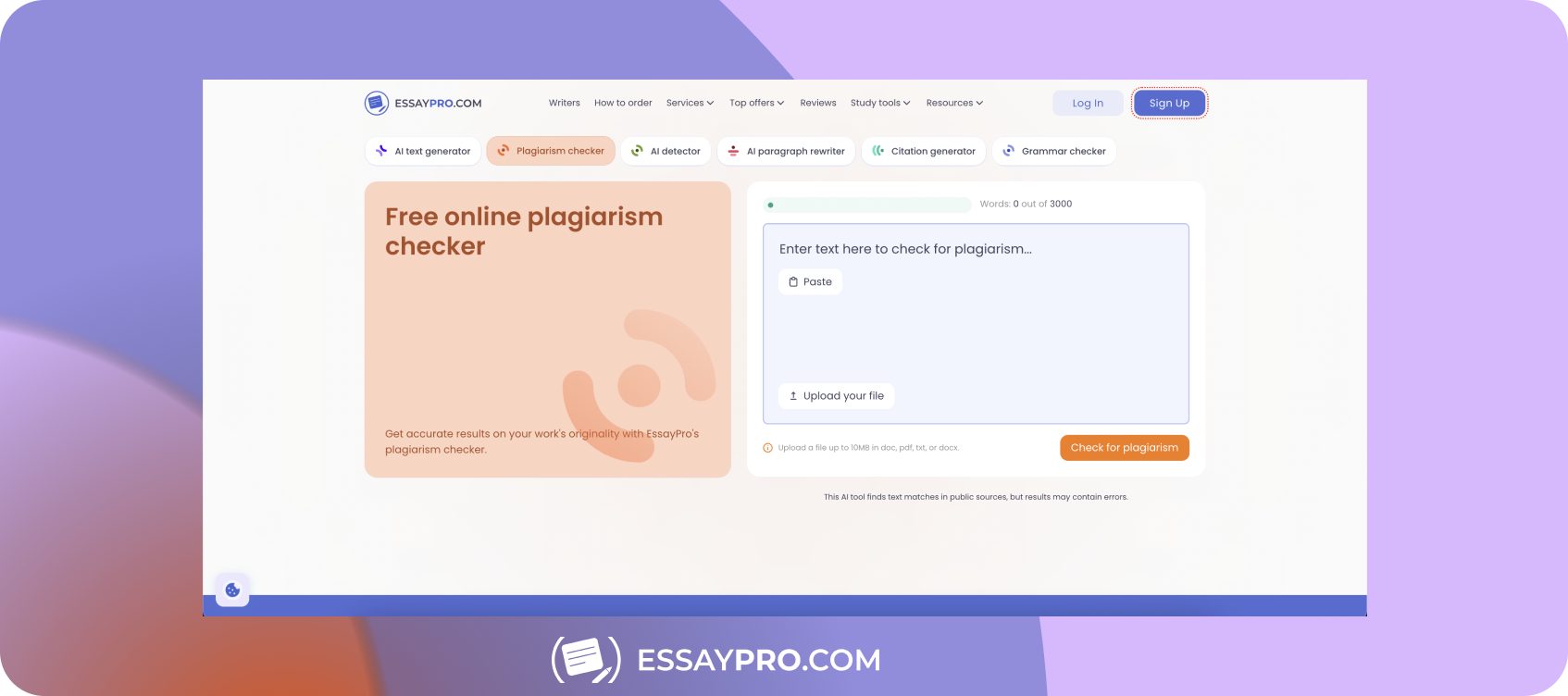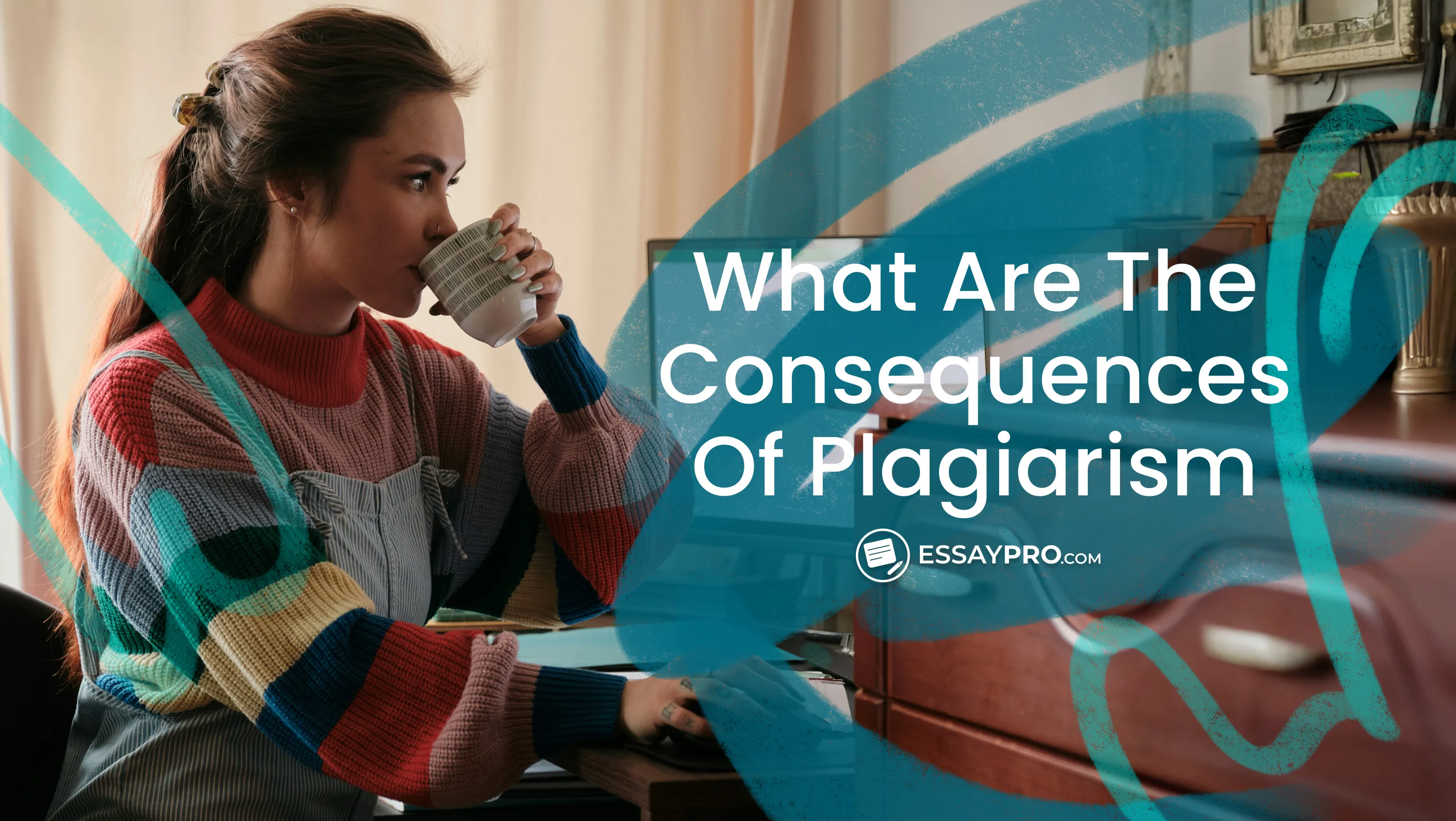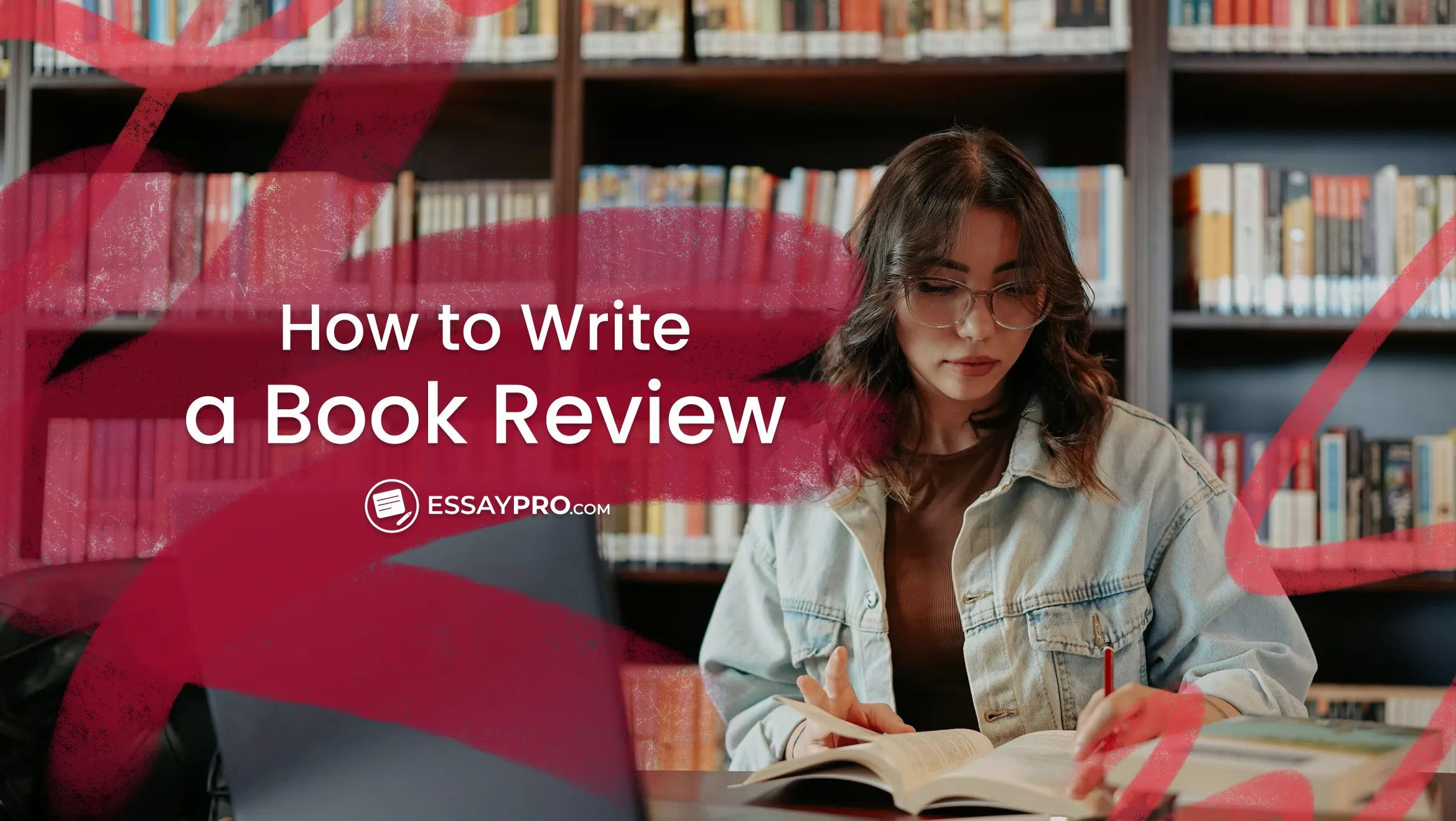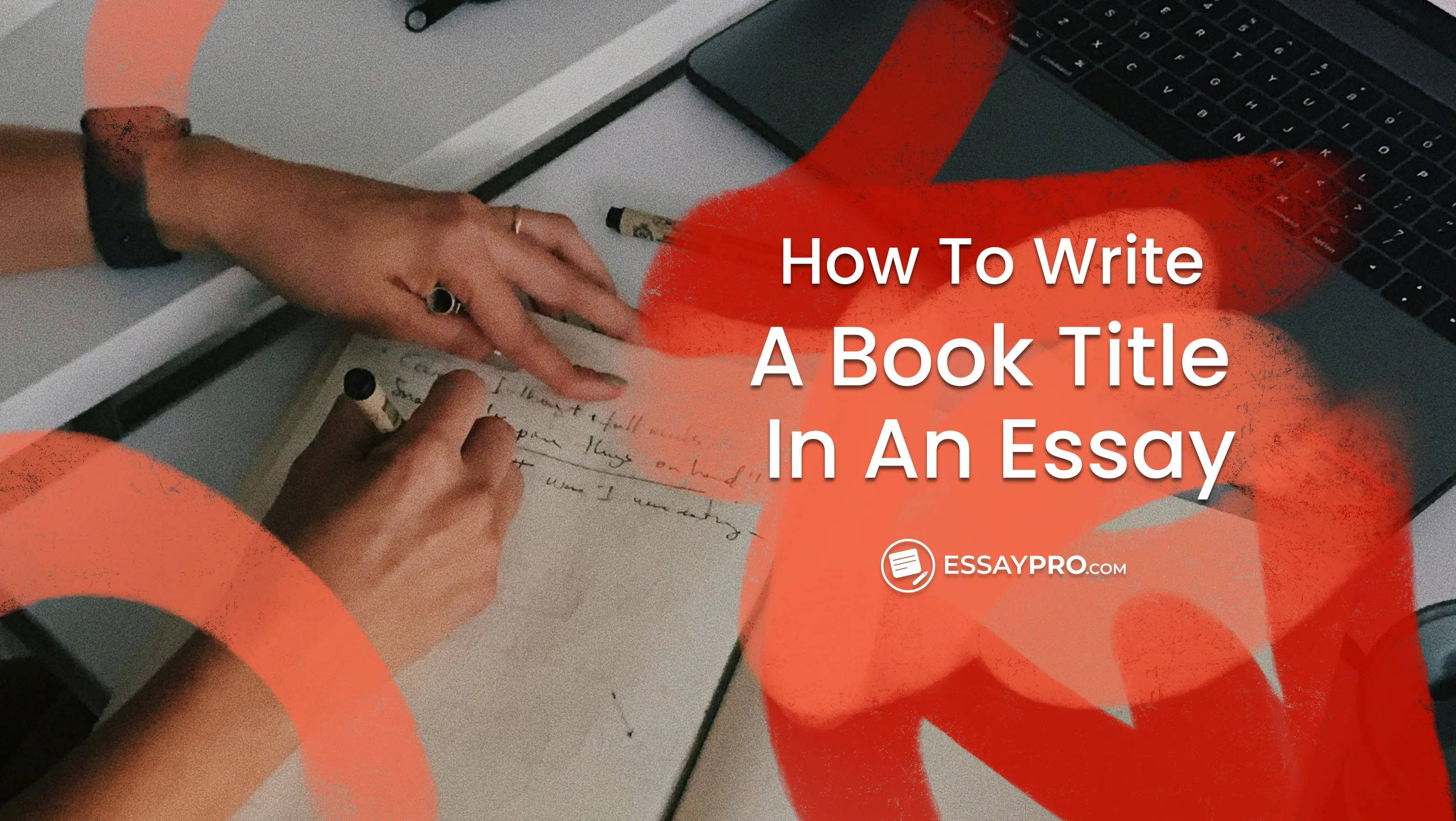You pull another late night, the cursor blinking on a half-finished essay. A quick copy-paste from an article feels like the fastest way forward. The next morning, your professor runs it through a plagiarism detection software. That ‘shortcut’ turns into a serious problem. Rutgers University found that 38 percent of undergraduates admitted to copying text without proper citation at least once.
This article explains the consequences and penalties for plagiarism, from self plagiarism to unintentional plagiarism, so you know exactly what’s at stake.
EssayPro helps stop it before it starts. You can get direct feedback from real experts, and a plagiarism checker that finds issues in seconds.
🤖 AI Detection: Friend or Foe?
Have you encountered similar challenges? How did you prove your work's authenticity? Join the discussion in our EssayPro Community to share experiences, strategies, and insights with other students.


Academic Consequences
When people ask what are the consequences of plagiarism in college, the answer carries serious weight. Universities treat committing plagiarism as a breach of academic integrity and academic misconduct and are responded to with measures that can lead to disciplinary sanctions like a failed grade, suspension, or expulsion. These can involve grade penalties, disciplinary sanctions, and, in some cases, removal from the program.
The University of Michigan outlines it clearly:
‘If you are found responsible for academic misconduct, appropriate grade penalties for the infraction will be at the discretion of the instructor… Grade penalties can range from a grade reduction on the assessment to failure of the course… Most first-time offenses… result in a college-level sanction of disciplinary probation.’
Typical outcomes include:
- A failing grade on the assignment.
- A failing grade for the course.
- Disciplinary probation for a set period.
- Expulsion for repeat or severe cases.
A 2023 survey from the International Center for Academic Integrity found that over 60 percent of students admit to cheating. That’s a lot of people playing with fire.
Workplace Problems
Committing plagiarism at work can drain your paycheck and your reputation. Copy a colleague’s proposal, other person’s work, articles written, etc; Even pasting content from someone else’s work without proper attribution or citation can cause serious damage. It starts fast, with lost trust, jobs vanished, and lawyers getting involved.
In the U.S., willful copyright infringement is a criminal offense and can mean fines up to $250,000 and as much as five years in prison. Even when it’s accidental, you could still owe $750 to $30,000 for each piece of work, plus attorney bills.
What are the consequences for plagiarism in the office?
- Promotions pulled.
- Clients gone overnight.
- Legal teams chasing you for months.
- In extreme cases, prison.
Check out these homonyms examples to avoid plagiarism by accidentally mixing them up.
Financial Consequences
The cost of getting caught plagiarising can drain your bank account, derail your education, and leave you paying for mistakes long after the incident. Some students lose funding overnight, and professionals have seen entire paychecks vanish to cover fines or legal bills. Financial consequences of plagiarism include:
- Significant punishment fines for copyright infringement can range from hundreds to hundreds of thousands of dollars.
- Settlement payments to the original author or rights holder.
- Losing grants and refunding tuition from the college or some other institution gets in the way of academic development.
- Paying for mandatory ethics or writing courses required by a school or employers.
- Covering attorney fees during disputes.
- Losing income from suspended contracts or terminated employment.
Personal Consequences
Plagiarism dents your credibility. Once your name is linked to copied work, professors or managers start questioning everything you submit. That suspicion can stick for semesters or even years.
It also slows skill development. Avoiding the research process, drafting, writing, and revision means you miss the practice that makes future projects faster and better. Deadlines start feeling tighter because the work feels harder.
The guilt is practical, not poetic, with rules and regulations following. You know you cut corners, and that knowledge makes group projects, peer reviews, and performance evaluations a lot more uncomfortable.
Third-Party Problems
Plagiarism goes beyond one person’s record. A university’s name can end up in headlines for all the wrong reasons. Once that happens, every graduate walks into job interviews with a degree that might raise questions.
In the workplace, the fallout gets messy. Clients leave. Partners hesitate to sign new deals. The company spends months trying to rebuild trust. Ever tried winning back a customer who feels lied to?
People get caught in the crossfire, too. Other students, faculty, supervisors, and even the original author can see their own credibility slip simply because they were connected to the work.
Legal Consequences of Plagiarism
Plagiarism turns into a legal fight when it violates copyright law and regulations and is treated as theft of intellectual material. In the U.S., that means it falls under federal copyright law. And those penalties aren’t light.
The U.S. Copyright Act puts it plainly:
‘Anyone who violates any of the exclusive rights of the copyright owner… is an infringer of the copyright’ (17 U.S.C. § 501).
Willful infringement can cost up to $250,000 and bring five years in prison. Even ‘I didn’t know’ cases can still cost you $750 to $30,000 per work, especially if the original author files a claim, plus attorney fees.
Other countries play just as hard. In the UK, fines have no cap, and prison sentences can last ten years. In Australia, it can top AUD 100,000.
These serious consequences further demonstrate why is it important to avoid plagiarism both in academic and professional settings.
Real Cases of Plagiarism and Their Fallout
Let’s look at famous cases and the plagiarism consequences they’ve faced in real life, from universities to political arenas. Each of these cases shows how failing to give proper attribution, credit, quotation marks, or references to the original author can destroy careers in academia, politics, and business.
- At the university level, Hungarian President Pál Schmitt resigned after his doctoral thesis was found to have 180 out of 215 pages copied from other researchers. Semmelweis University revoked his doctorate, and he stepped down from office in April 2012.
- In politics, Germany’s Defense Minister Karl-Theodor zu Guttenberg lost his doctorate and resigned after a commission confirmed he had copied large portions without citation. In Serbia, Siniša Mali’s doctorate was annulled after a long plagiarism probe, yet he stayed in office. In Norway, Minister Sandra Borch resigned when a student exposed plagiarism in her master’s thesis, damaging her credibility on academic policy.
- Among professors, ASU historian Matthew C. Whitaker resigned after repeated plagiarism allegations. At Wichita State University, President Richard Muma faced scrutiny when most of his dissertation pages were shown to be copied from other sources.
- At the diploma stage, Taiwanese mayor Lin Chih-chien lost two master’s degrees after investigations confirmed both theses were plagiarized.
- In the workplace, CNN journalist Fareed Zakaria was suspended in 2012 after copying parts of a Time column from a New Yorker article by Jill Lepore. He was later reinstated, but the incident stayed attached to his name for years.
Some public figures have responded to plagiarism accusations with open letters, trying to show their side of the story. If you ever need to do the same or are just curious, here’s an open letter example.
Prevent Plagiarism with Plagiarism Checker by EssayPro

Getting flagged for cheating can lead to a punishment for plagiarism that wrecks grades, scholarships, funding, and even job offers. EssayPro's plagiarism detection software helps stop that chain reaction before it starts.
- Find matches fast: Scan your draft in seconds.
- See exact sources: Locate copied lines instantly.
- Check anytime: No sign-up or delays.
- Fix issues early: Edit before submission.
.webp)
Missed citations, accidental copying, drafts that aren’t as clean as you think. The solution is an online plagiarism checker that catches problems early, keeps your work original, and protects your academic reputation.
Wrapping it Up
Committing plagiarism can wreck far more than a grade. Degrees get pulled, and jobs disappear. A single copied paragraph can start with expulsion and spiral into lawsuits that end in six-figure fines.
So stay on the safe side with EssayPro, which catches risky text before your professor sees it. Spend five minutes checking, and you can save months of guaranteed damage later.
FAQs
What Happens If You Get Caught For Plagiarism?
If you’re in college, you’ll probably fail your assignment and lose your scholarship, while some students can even face suspension or expulsion. As for work, you can be fired and take on legal costs.
What Is The Biggest Punishment For Plagiarism?
In the U.S., willful copyright theft can result in fines up to $250,000, a five-year prison sentence, and a criminal record that follows you long after.
Can You Go To Jail For Plagiarism?
Yes. In the U.S., plagiarism tied to copyright violations can mean prison time of up to five years. The UK and Australia take a similar approach, with fines that can pass $100,000 and other legal penalties.

Mariam Navrozashvili
She has a Master’s degree in English Literature and brings a deep understanding of storytelling, critical analysis, and language structure to her work. On EssayPro Blog Mariam writes guides on literary analysis, essay composition and language studies to help students improve their writing skills. In her free time she likes to read classic novels and discuss literary theory.
- Plagiarism.org. (n.d.). Plagiarism facts and stats. Retrieved August 11, 2025, from https://www.plagiarism.org/article/plagiarism-facts-and-stats
- University of Michigan. (n.d.). What to do if you are suspected of academic misconduct. College of Literature, Science, and the Arts. Retrieved August 11, 2025, from https://lsa.umich.edu/lsa/academics/academic-integrity/what-to-do-if-you-are-suspected-of-academic-misconduct.html
- International Center for Academic Integrity. (n.d.). Facts. Retrieved August 11, 2025, from https://academicintegrity.org/aws/ICAI/pt/sp/facts
- U.S. Department of Justice. (n.d.). Copyright infringement penalties (17 U.S.C. § 506(a) and 18 U.S.C. § 2319). Retrieved August 11, 2025, from https://www.justice.gov/archives/jm/criminal-resource-manual-1852-copyright-infringement-penalties-17-usc-506a-and-18-usc-2319







